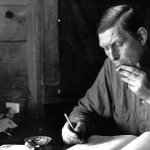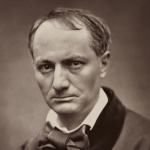Highlight Actions
Enable or disable annotations
Busy old fool, unruly sun,
Why dost thou thus,
Through windows, and through curtains call on us?
Must to thy motions lovers' seasons run?
Saucy pedantic wretch, go chide
Late school boys and sour prenticesprentices apprentices,
Go tell court huntsmen that the king will ride,the king will ride James I, the king of England at the time of Donne’s writing, had a known passion for riding horses and hunting.
Call country ants to harvest offices,
love, all alike, no season knows nor clime,
Nor hours, days, months, which are the rags of time.rags of time a figure of speech meaning that such things are passing and immaterial. Donne uses this phrase in one of his sermons.
Thy beams, so reverendreverend worthy of high respect and strong
Why shouldst thou think?
I could eclipse and cloud them with a wink,
But that I would not lose her sight so long;
If her eyes have not blinded thine,
Look, and tomorrow late, tell me,
Whether both th' Indias of spice and mineboth th’ Indias of spice and mine the East Indies for spices and the West Indies for gold. In a 1623 letter to Sir Robert Ker, Donne wrote: “Your way into Spain was Eastward, and that is the way to the land of Perfumes and Spices; their way hither is Westward, and that is the way to the land of Gold, and of Mynes.” [John Donne: Selected Prose. Edited by Helen Gardner and Timothy Healy, p. 155]
Be where thou leftst them, or lie here with me.
Ask for those kings whom thou saw'st yesterday,
And thou shalt hear, All here in one bed lay.
She's all states, and all princes, I,
Nothing else is.
Princes do but play us; compared to this,
All honor's mimic, all wealth alchemyalchemy figuratively, not the real thing. The speculative practice of alchemy involved a search for chemically turning base metals, such as iron, into highly valuable metals, such as gold..
Thou, sun, art half as happy as we,
In that the world's contracted thus.
Thine age asks ease, and since thy duties be
To warm the world, that's done in warming us.
Shine here to us, and thou art everywhere;
This bed thy center is, these walls, thy sphere.





















Comment form: